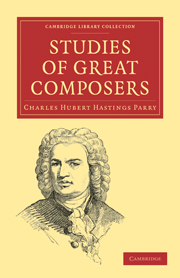XII - CONCLUSION
Published online by Cambridge University Press: 29 August 2010
Summary
People's opinions differ as much about composers as about all other subjects under the sun, more especially when they are discussing contemporaries and neighbours. The enthusiastic amateurs of a provincial town think the local professor who publishes an occasional anthem or part-song, or a piece for the organ or pianoforte, to be quite among the marvels of the age; and similarly, on a larger scale, nations who do not know much of solid music set a man who can make the sort of jingle that pleases them far above the greatest masters of the art, if the latter happen to belong to other countries. In both cases there may be something to excuse the misplaced admiration; for the provincial organist or professor may be an excellent master of counterpoint, and the popular composer may produce some really good tunes, or write so well for the voice as to give the singer very exceptional opportunities. But the extravagant opinion of their admirers is always received with caution by persons of experience; for they know that it is likely to be the result of want of experience and understanding of what is really first-rate.
Music does not stand alone among arts in this respect. Poetry and painting suffer almost as much from the want of taste and discernment of the public; and considering how difficult all art is, and what an amount of patience and intelligence is necessary to master even a few of the principles which help to a correct judgment, and what stumblingblocks there are in the constitution of the human mind itself, it is not to be wondered at.
- Type
- Chapter
- Information
- Studies of Great Composers , pp. 357 - 376Publisher: Cambridge University PressPrint publication year: 2009First published in: 1887



